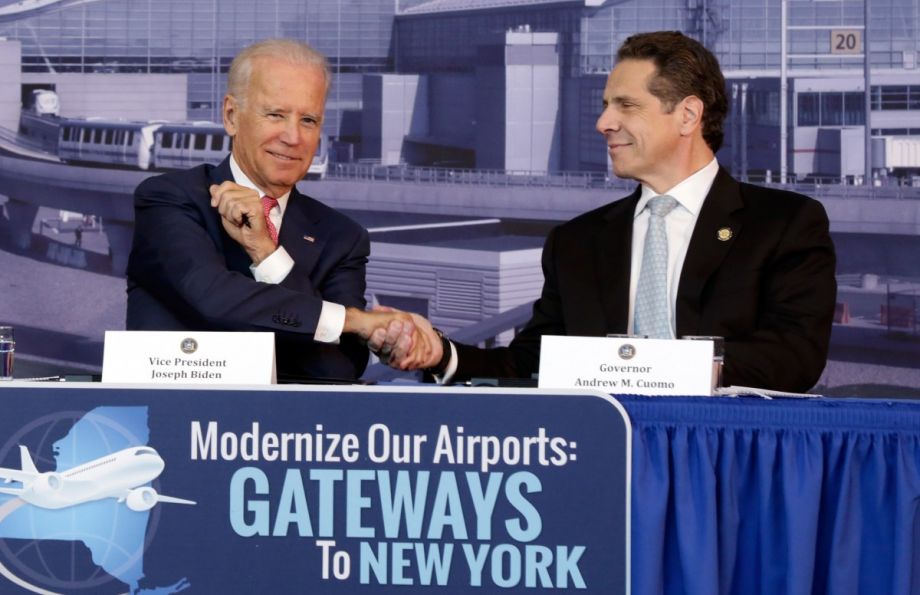The office of the vice president is not exactly known for setting policy priorities. In fact, it’s long been considered an irrelevancy at best, a joke at worst, in the accounting of importance of influence that occupies the nation’s capital.
So Joe Biden’s rant the other day about American infrastructure isn’t likely to result in anything but some bemused headshaking from the people who hold the power and the purse strings in Washington and the nation’s state capitals. That’s too bad.
Speaking at the Washington Post’s America Answers conference on transportation, Biden lamented the state of the nation’s roads, rails, ports and airports, singling out New York’s LaGuardia for special contempt. (It’s not the first time Biden has bashed LaGuardia; in February, he said the airport seemed like “it was in some third-world country.”)
“It fundamentally crimps the economics of the greatest city in the world,” said Biden in a tone of disbelief. “The single greatest city in the world having an airport like that? How can that be? How can that be? How can we not improve it?”
How can that be? Well, here’s how.
Every time a politician expresses support for major infrastructure projects — which are inevitably going to cost money — he or she has to go immediately on defense. People like smooth roads and functional airports and all the rest of it. But they don’t want to pay for them. That leads to complicated political games that obscure cost and confuse the planning process, often leading to delays, the construction of flawed infrastructure or the abandonment of major projects.
Take the Tappan Zee Bridge over the Hudson, which is currently being replaced at a projected cost of $3.9 billion after years of wrangling over cost and design. The bridge provides a vital link between a huge population and employment centers on either side of the river.
But at the New York gubernatorial debate the other night, Democratic incumbent Andrew Cuomo and Republican challenger Rob Astorino were both eager to make it seem like New Yorkers won’t actually have to pay for the thing with higher tolls, or really in any way that they would actually, you know, notice.
Cuomo, who likes to pat himself on the back for getting the bridge going when it had been stalled for 20 years, has been trying to find some of the money to pay for it in a federal loan under a clean water program run by the Environmental Protection Agency — a ploy that was rejected by the EPA just a couple of weeks ago. The Tappan Zee only qualifies for $29 million under that program, they say, a fraction of the nearly $511 million that Cuomo was looking for.
Astorino, for his part, says that if the state uses money from a windfall $4.2 billion settlement it’s getting from banks, tolls won’t have to go up on the Tappan Zee or the New York State Thruway. The hard truth is that while the settlement money might help to get the bridge built, the state has a lot of other things to spend it on — and, as the Albany Times-Union points out, the toll probably still should go up to pay for maintenance and other operating costs.
Just a bit down the Hudson in New Jersey, Gov. Chris Christie killed what would have been the biggest infrastructure project in the nation when in 2010 he pulled New Jersey’s funding from a badly needed new rail tunnel known as Access to the Region’s Core, or ARC. He then proceeded to put the money that the state would have spent on that infrastructure into repairing New Jersey’s roads, which have been crumbling because neither Christie nor anyone else has dared to raise the state’s gas tax since 1988. Jersey’s tax is currently the second lowest in the nation, after the oil-producing state of Alaska, although it’s not clear how much longer a hike can be averted, given the disastrous condition of the state’s transportation finances.
As a result of that 2010 decision on the ARC Tunnel — which is hard not to see in a political light given Christie’s long-standing national ambitions in the 2016 presidential race — New Jersey and New York, and the entire Northeast region, will face potentially crippling rail traffic snafus when Sandy-related damage to the existing tunnels needs to be repaired in the near future.
Meanwhile, in Washington, Congress keeps kicking the transportation funding can down the road, having recently failed yet again to buckle down and create a transportation bill that faces up to the problem at hand.
“It spurs investment when you modernize these roads, ports, airports,” Biden said the other day, “generating more jobs, all connecting to more economic activity.” Somehow, though, the word “investment” has largely fallen out of the vocabulary of the nation’s politicians. It has been replaced by “spending,” and it is always bad, and we shouldn’t do it.
“What are we doing?” Biden asked in his frustration. “What are we doing?” We’re pretending that we can get something for nothing, is what we’re doing. And it shows.
The Works is made possible with the support of the Surdna Foundation.

Sarah Goodyear has written about cities for a variety of publications, including CityLab, Grist and Streetsblog. She lives in Brooklyn.









